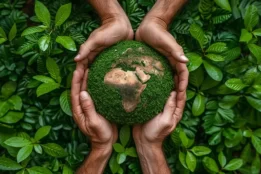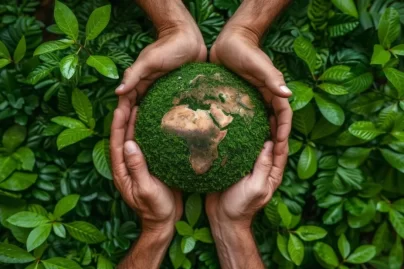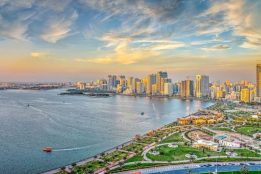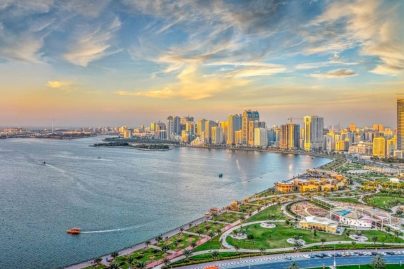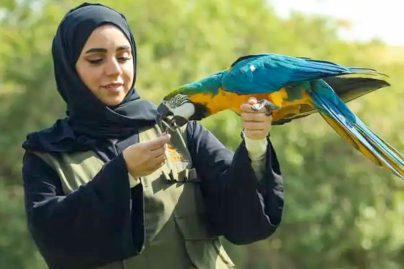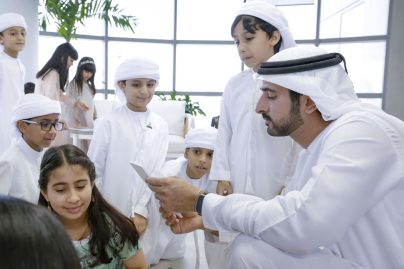India- UAE signed MOU for promoting local currencies in cross-border trade. Target of reaching US$100 billion non-oil trade annually over the next five years
Sat 15 Jul 2023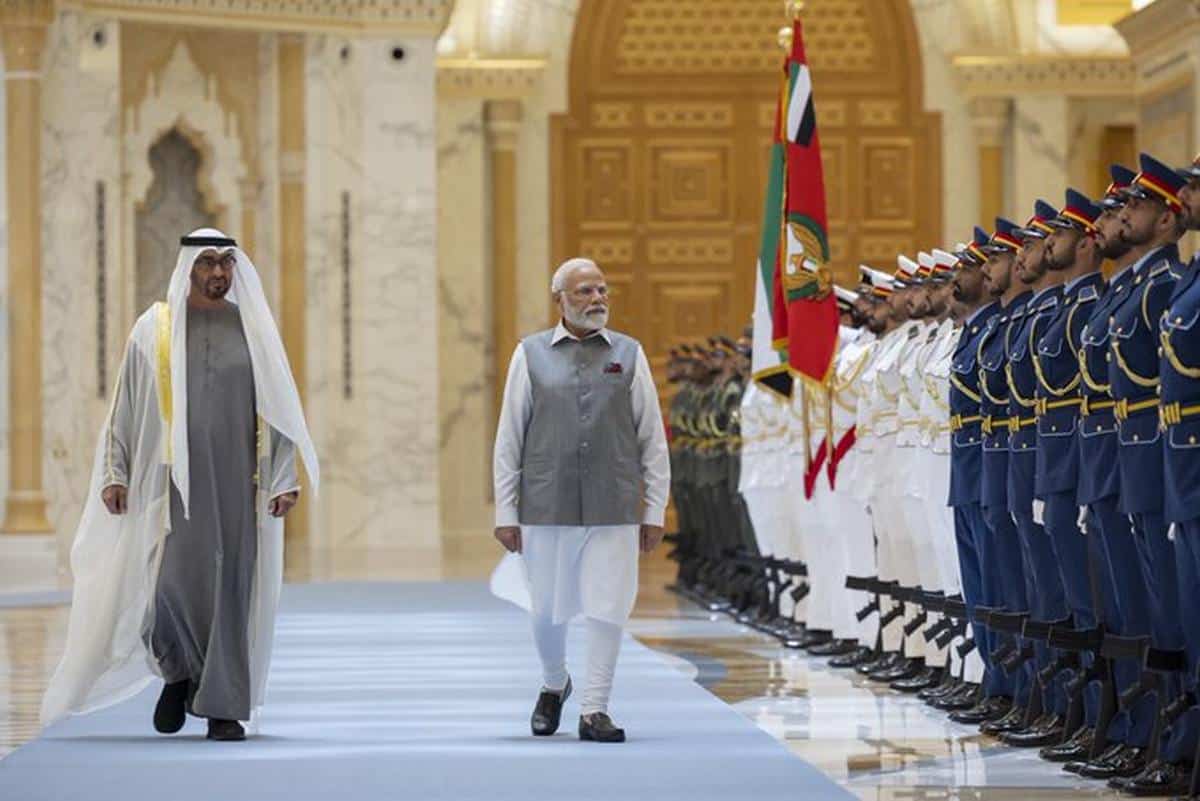
ABU DHABI: The meeting of Indian PM Narendra Modi and UAE President Sheikh Mohammed bin Zayed Al Nahyan in Abu Dhabi on Saturday comes with many new landmark initiatives. They discussed strengthening the ”distinguished historical relations” between the UAE and India and ways to achieve the goals of the ambitious strategic and development partnership.
In the morning H.H. Sheikh Khaled bin Mohamed bin Zayed Al Nahyan, Crown Prince of Abu Dhabi, received Narendra Modi, Prime Minister of India, in Abu Dhabi, at the start of his official visit to the UAE. His Highness welcomed the Prime Minister of India and his accompanying delegation. Prime Minister also inspected the ceremonial Guard of Honour with HH Sheikh Mohammed bin Zayed at the magnificent Qasr Al Watan.
In the biggest break through India and the United Arab Emirates are agreeing to start trade settlement in local currencies, Indian Prime Minister Narendra Modi announced. At present, India, the world’s third-biggest oil importer and consumer and whose central bank last year announced a framework for settling global trade in rupees, pays for UAE oil in dollars.
The Reserve Bank of India and the Central Bank of the UAE signed two MUOs to establish a Framework to Promote the Use of Local Currencies for Cross-border Transactions and cooperation for interlinking their payment and messaging systems. This agreement will establish a Framework to Promote the Use of Local Currencies viz. the Indian rupee (INR) and the UAE Dirham (AED) for cross-border transactions, and interlinking their payment and messaging systems. The MUOs were signed by the Governor of the Reserve Bank of India, Shaktikanta Das and the Governor of the Central Bank of UAE, H.E. Khaled Mohamed Balama.
This will give the liberty to pay in the respective domestic currencies, which in turn would enable the development of an INR-AED foreign exchange market. This arrangement would also promote investments and remittances between the two countries. The use of local currency transactions would optimize transaction costs and settlement time for transactions, including for remittances from 3.8 million Indians residing in UAE.
The UPI-IPP linkage will enable the users in either country to make fast, convenient, safe, and cost-effective cross-border funds transfers. The linking of Card Switches will facilitate the mutual acceptance of domestic cards and the processing of card transactions. The linkage of messaging systems is aimed to facilitate bilateral financial messaging between the two countries. These MUOs are aimed at facilitating seamless cross-border transactions and payments and fostering greater economic cooperation between the two countries.
Another major achievement of this bilateral talk is IIT Abu Dhabi Campus. An MOU between the Ministry of Education of the Government of India and the Department of Education and Knowledge, Abu Dhabi and Indian Institute of Technology Delhi for planning to establish Indian Institute of Technology Delhi – Abu Dhabi, United Arab Emirates. It will set a brand-new template for leveraging the power of knowledge for both mutual prosperity and global good.
On the IIT Abu Dhabi, Ambika Gulati, CEO & Principal- Of The Millennium School-Gems, Dubai appreciated this effort and said that “As an Indian resident in the United Arab Emirates, I feel very proud that the prestigious Indian Institute of Technology is opening a campus in Abu Dhabi. I’m also delighted that IIT has chosen the UAE as the location for its first offshore campus, as the decision reflects the close and deep ties that exist between the two countries. The opening will no doubt strengthen the reputation of India’s education sector, given IIT’s status as a highly sought-after institute of excellence in the field of engineering. This is a landmark event. As a school leader aware of the large number of students who aspire to study at an IIT in India, I view IIT’s Abu Dhabi campus as a great opportunity and motivator for Indian students studying in the UAE. I am curious to know whether the new campus will provide preference to students who have studied in the UAE, or if the overall IIT-JEE rank will be the only deciding factor for admission.”
Dr. Vajahat Hussain, CEO, of Amity Education Middle East and Amity University Dubai said, “The opening of IIT Abu Dhabi will be a milestone in the UAE-India relationship. The personal relationship between the President of the UAE His Highness Sheikh Mohammed Bin Zayed Al Nahyan and Prime Minister His Excellency Narender Modi has taken the UAE-India relationship to a much higher level in the last 4 years. Now the opening of the IIT in Abu Dhabi is a testament to the fact that there is a validation of the excellence in education that the Indian Institutes of Technology represent. With the development of the National Strategy for Higher Education 2030, the UAE is committed to ensuring that the next generation of leaders is at the forefront of innovation. This is a great opportunity for students in the UAE and the wider region, to benefit from the academic excellence, diverse curricula, and innovative teaching methods that IITs are known for. As a preferred higher education destination in the Middle East, international students choosing the UAE to study get access to the future of education, global educators, and state of art facilities. Having IITs alongside world-class institutions here will only add to the quality of education being offered by UAE institutions. The UAE is a hub for international education, it offers a dynamic, innovative, and inclusive learning environment that attracts students and scholars from diverse backgrounds. We wholeheartedly welcome this great initiative within the UAE-India partnership framework.’’
Dr. Azad Moopen, Founder Chairman & Managing Director, of Aster DM Healthcare said, “It is remarkable to see the bilateral trade between India and UAE cross the historic $85 billion mark, with a 20% growth since the signing of CEPA last year. The agreement signed in the meeting between Prime Minister Shri Narendra Modi and President of UAE HH Sheikh Mohamed bin Zayed Al Nahyan to conduct trade between the two countries in local currencies is set to exponentially increase growth across key sectors. The impact could be significant in energy, fintech, defence, healthcare, education etc. and will enable knowledge sharing, innovation and start-up ecosystems while further supporting businesses which have a strong presence in India as well as UAE. Aster with its major presence in India and UAE shall be a beneficiary of this. It is also encouraging to see India’s support to UAE’s COP28 Presidency and sustainable development goals through Mission Life.”
On the local currency cross-border trade, Kamal Vachani, Group Director & Partner -Al Maya Group, appreciated this step, “This is an amazing opportunity for the cross-border trading community, where traders from both sides will benefit. Not only traders, the huge flow of Indian tourists will also save it currency exchange charges and time too.”
Both the top leaders engaged in warm conversation about the historical ties between the two countries and their people and praised the level of joint strategic cooperation between the two nations across multiple vital sectors.
The significant growth in the volume of non-oil trade between the UAE and India signifies the positive progress of the Comprehensive Economic Partnership Agreement (CEPA), more than a year after it entered into force, which puts it on the right track to deliver the target of reaching US$100 billion in non-oil trade annually over the next five years.
During 2020-2022, the volume of non-oil trade exchange between the UAE and India has grown by 84 percent, from AED102.5 billion to AED188.8 billion last year, according to data from the Federal Competitiveness and Statistics Centre. During the past ten years (2013-2022), the trade growth rate between the two countries amounted to 18.2 percent, from AED 159.72 billion to AED188.8 billion last year, to reach AED1.41 trillion in 10 years.
The UAE-India CEPA played a vital role in strengthening joint economic and trade relations towards further growth and prosperity and creating a momentum of opportunities for the Emirati and Indian business communities. As per the latest official data released this year, the UAE invested US$36.61 billion in various sectors, including financial services, real estate, business services, alternative and renewable energy, engine manufacturing, equipment, and more.
The UAE chose India as the first country to sign a comprehensive economic partnership agreement with, in light of their strong strategic ties. India is a key ally and partner for the UAE in trade and investment, and they have a long history of friendship. This is also India’s first agreement of this kind with a country in the Middle East and North Africa region.
The UAE-India partnership is a driver for economic growth that creates trade and investment opportunities for over 3.8 billion people. The economic partnership contributes to the vitality of trade and investment flows in South Asia and through it towards regional and global markets.

 Apr 27 2024
Apr 27 2024
